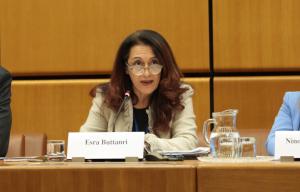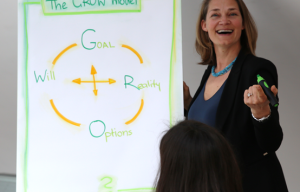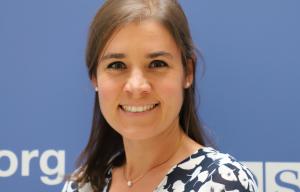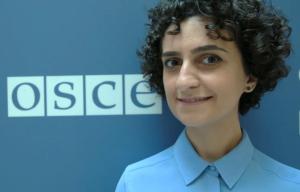Esra Buttanri
Esra Butanri is a Senior Adviser at the OCEEA - OSCE Secretariat

Tell us about your background.
I am an environmental engineer by education, followed by twenty-five years of work experience in the environment, and in the environmental aspects of development and security. I started my career with the Turkish Ministry of Environment in 1989, and then served over two decades at UNDP and the OSCE, in progressive roles. Throughout these years, I have developed, fund-raised for, and managed several multi-country and multi-partner projects.
Since the early years of my career, I have had the opportunity to participate in the global, regional and national processes for sustainable development and environmental diplomacy. Some examples include the 1992 Rio Conference on Environment and Development and its follow up through the Rio+10 and the Rio+20 processes, the process leading up to the Sendai Framework for Disaster Risk Reduction, the Environment for Europe process, and the processes for implementation of major multilateral environmental agreements, such as the Water Convention, the Aarhus Convention, the Espoo Convention and others.
What's your role at the OSCE and what have you done before joining us?
At the OSCE, I have had the opportunity to contribute to Organization’s efforts in strengthening environmental co-operation, as well as in addressing potential security risks associated with climate change, unsustainable management of natural resources, disasters or hazardous waste. I have also had the opportunity to be part of the Organization’s efforts in supporting the implementation of the 2030 Agenda and the Sustainable Development Goals (SDGs).
Before joining the OSCE, I served as Programme Manager at the UNDP Country Office in Turkey. During my almost ten years of work in UNDP, I developed and managed a diverse portfolio of projects, mainly focusing on capacity building for environmental risk reduction and good governance. Initiation of a local administrations’ network for localizing sustainable development, creation of a youth network on environment and sustainable development; design and implementation of a small grants programme to support environmental projects of local NGOs, and strengthened capacities for community-based disaster risk reduction are among the results of my programme porfolio. In my work, I co-operated closely with my peers in other UNDP Country Offices and designed and implemented several joint initiatives with them, mainly aiming for expansion and replication of best practices from our respective areas of work. At the OSCE, my environmental expertise and experience have helped me to make an accurate assessment of environmental risks that could impact security, and to generate viable and innovative solutions, mostly at transboundary level, that reinforce cross-border environmental co-operation, and thus contribute to security and stability.
How would you describe your portfolio?
As a Senior Advisor at the Office of the Co-ordinator of OSCE Economic and Environmental Activities (OCEEA), I work on climate change & security, including within the context of sustainable development. Previously, I served as the Head of Environmental Co-operation Unit in the OCEEA. In light of my years of experience with the Organization, I can name three main features of my job that I like the most: First, it has provided me with the opportunity to contribute to environmental diplomacy within the context of the Organization’s comprehensive approach to security. At the same time, it has enabled me to do my share in translating political commitments into real action on the ground through projects that we have implemented for the people and with the people, with the help of our Field Operations and the Aarhus Centers. And, the third is the possibility to explore new avenues and workstreams within the framework of new or longstanding partnerships, such as the Environment and Security (ENVSEC) Initiative.
The founding document of the OSCE- the Helsinki Final Act - already in 1975, affirmed the link between economic development, environmental protection, and social issues as well as their interactions with security and stability. This was even before the term “sustainable development” came into use. The 2030 Agenda states, “There can be no sustainable development without peace and no peace without sustainable development.” The OSCE contributes to all five pillars of the 2030 Agenda- people, peace, planet, prosperity, and partnership. SDG 16 goes to the heart of our work. But several other SDGs are important to us in the OSCE: In the environmental sphere, for instance, I can name the SDG 6 on clean water, SDG 11 on sustainable cities, SDG 12 on sustainable consumption and production, the SDG 13 on climate action, and the SDG 17 on partnerships. One of the unique features of OSCE’s engagement in the 2030 Agenda is its transboundary and regional approaches to the SDGs, bridging global and national action.
If you are an environmental expert, and if you have the ambition to broaden your perspective and apply your environmental knowledge to reinforcing peace, security and stability, the OSCE would be the right place for you to work.


